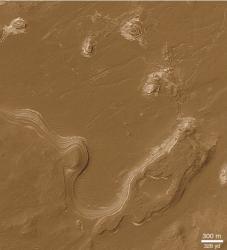 If they want to find life on Mars, future explorers will need to dig down deep under the surface. This is according to new research published by University College London Researcher Lewis Dartnell.
If they want to find life on Mars, future explorers will need to dig down deep under the surface. This is according to new research published by University College London Researcher Lewis Dartnell.
It might seem obvious, but Mars is a planet that’s clearly inhospitable to life. Especially near the surface. Dartnell figures the first couple of metres of soil are probably bathed in so much radiation, that even the hardiest bacteria wouldn’t last long. But if you can get down below that, chances improve. The soil will shield life from harmful cosmic radiation, and there are likely deposits of water (in the form of ice) that can provide additional protection.
Unfortunately, none of the current spacecraft planned to visit Mars will be equipped with a way of drilling through metres of rock, ice and sand to get down to a potential layer of life. To make the job easier, the researchers are suggesting missions drill in regions of fresh ice, which can protect the bacteria underneath it.
Original Source: UCL News Release
